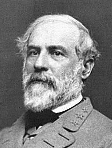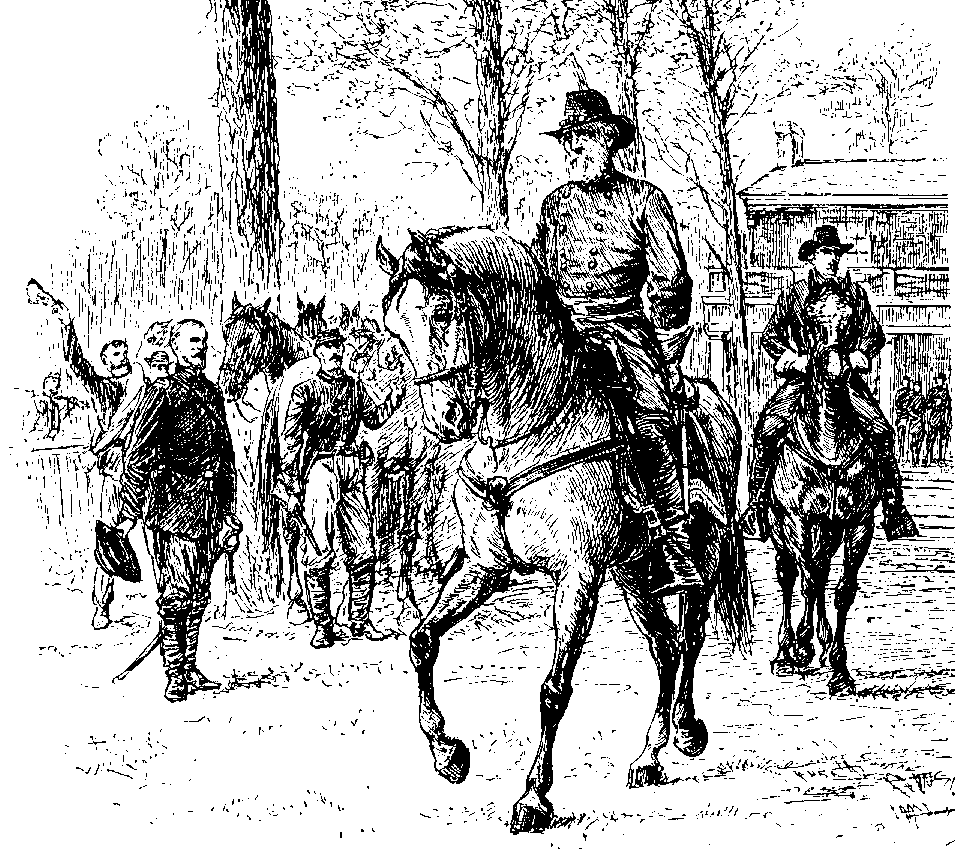
CONFEDERATE STATES OF AMERICA
1807-1870

|
Robert E. Lee CONFEDERATE STATES OF AMERICA 1807-1870 |
There he stood, the grand old hero, great Virginia's
god-like son
Second unto none in glory - equal of her Washington

So much has been said about Lee the the soldier, Lee the statesman, Lee the family patriarch, and Lee the man that it is difficult to find simple phrases to sum up his life. Perhaps the best can be found in Philip van Doren Stern's biogrpahy Robert E. Lee, The Man and the Soldier.
The public images of Robert E. Lee are many. There is the young, handsome officer of the Engineer Corps, the dutiful husband and the affectionate father, the fighting soldier of the Mexican War, the world renowned commander of the Army of Northern Virginia. And then there is the peace-loving, quiet, fatherly college president. They are all Lee, all facets of the same basically simple, straightforward person ... He should be remembered not merely as Lee the soldier or even as Lee the educator, but also as Lee the man - the man of honor, the great gentleman, good and decent human being, who others - even his enemies - knew could be trusted without reservation.
 |
QUOTES |
|
A union that can only be maintained by swords and bayonets, and in which
strife and civil war are to take the place of brotherly love and kindness,
has no charm for me. It is history that teaches us to hope. There is no better way of defending a long line than by moving into the
enemy's territory. This is murder, not war. It is painful to think how many friends will be separated and estranged
by our unhappy disunion. May God reunite our severed bonds of friendship,
and turn our hearts to peace! I can say in sincerity that I bear animosity
against no one ... [But] I must side either with or against my own section
of the country. I cannot raise my hand against my birthplace, my home, my
children ... I foresee that the country will have to pass through a terrible
ordeal, a necessary expiation, perhaps, of our national sin. Lee was a man nearly everyone liked and admired, but so few knew ...
Nearly an entire generation separated Lee from his principle subordinates
... For them, life with Lee was both uncomfortable and burdensome, and
their pledges of love and unerring devotion were postwar phenomena. Almost without exception, the great soldiers of the world from Alexander
to Napoleon had been fiercely ambitious, ruthless men. But Robert E. Lee
was neither ambitious nor ruthless. The most serious charges ever made
against his ability as a general were that he was too gentle, too kind,
too reluctant to hurt his subordinate's feelings. General Lee was one of the few men who ever seriously impressed and
awed me with their natural and inherent greatness. He was a foe without hate; a friend without treachery; a private
citizen without wrong; a neighbor without reproach; a Christian
without hypocrisy, and a man without guilt. He was a Caesar without
his ambition; a Frederick without his tyranny; a Napoleon without his
selfishness; and a Washington without his reward. |
This I regard as of more value to us than to have General Scott as
commander. He will undoubtedly rank as without any exception the greatest of all the
great captains that the English-speaking people have brought forth ... As a
mere military man, Washington himself cannot rank with the wonderful
war-chief who for four years led the Army of Northern Virginia. If there is one man in either army ... head and shoulders above every
other in audacity, it is General Lee. His name might be Audacity.
He will take more desperate chances and take them quicker than any other
general in this country, North or South. The shot that struck me down was the best ever fired for the
Confederacy. I prefer Lee to Johnson - Lee is too cautious and weak under grave
responsibility - personally brave and energetic to a fault, he yet is wanting
in moral firmness when pressed by heavy responsibility and is likely to be
timid and irresolute in action. It was all my fault. That old man had my divison slaughtered in Gettysburg. Gettysburg was the price the South paid for having R. E. Lee. Distinguished as was Lee's conduct while an officer in the Army of the
United States, splendid as was his career as a general in the field, nothing
in his life became him more than its end. His resolute refusal, in
circumstances of great difficulty and temptation, to take part in any of the
controversies which the war evoked ... all displayed more surely than did the
tests of the battlefield, high courage, sincerity of purpose, devotion to
principle, and nobility of mind. No man took upon himself more earnestly
Lincoln's charge, and with real abnegation of self set himself, 'with
malice toward none,' 'to bind up the nation's wounds.' |
 |
LINKS |
Biography. Very short biography of Lee.
The Apothoseis of Robert E. Lee. A journey through prose and poetry describing the beloved general in terms of Virginia, the South, and the nation. The same poetry dedicated to the memory of Robert E. Lee can be found in Robert E. Lee Poetry.
Stratford Hall. The Birthplace of Robert E. Lee. Includes a history, portrait gallery, and educational and research prorams.
Alexandria, VA, the boyhood home of Robert E. Lee. Information about this national historic landmark. Also has a good graphic of Lee as a young man.
Arlington House. The National Park Service's page devoted to Lee's beloved home of Arlington, VA.
Washington and Lee University. A history of the University displaying prominently the role Lee played.
Farewell. Lee's farewell address to the Army of Northern Virginia.
A Man's Character is his Destiny from "Thoughts Worth Thinking." A truly inspired comparsion between what we know of Lee's feelings on war and the Bhagavad-Gita. Interesting reading.
Memorial Home Page of Robert E. Lee. Still under construction. Keep an eye on this one ... it could be good.
 |
STUFF |
| Before the Civil War, Lee was assigned to the famous 2nd Cavalry Regiment. He served with this regiment on the Texas frontier from 1855 to 1857. It was commanded by Col. Albert Sidney Johnston and included other such notables as Major's William Hardee and George Thomas; Captains Earl Van Horn, E. Kirby Smith, Nathan Evans, Innis Palmer, Richard Johnson, and George Stoneman; and Lieutenant's John Bell Hood, Charles Field, William Chambliss, Charles Phifer, and Kennar Garrard. All became prominant commanders during the Civil War. The 2nd Cavalry would later become the 5th Cavalry during the Civil War, and later served out west fighting the Indian Wars. It was the unit to which George Armstrong Custer was attached. |
| One day a soldier who had transgressed in some fashion had been brought before Lee. As Lee entered the tent to hear the man's story, Lee attempted to put him at ease by saying, "Don't worry, you will get justice here." To which the soldier supposedly replied, "That's what I'm afraid of." Lee was a leader who exemplified undying honor, unrelenting justice, and inspired outright love. |
| Lee's audacity was legendary. But there came a time when that was sorely tested by the one commander who approached Lee's same level of boldness, Thomas Jonathan "Stonewall" Jackson. Lee was well known for splitting his forces on the battlefield. Following the Battle of Fredericksburg, his paltry 9 divisons faced 20 Federal divisons under Joe Hooker. Nevertheless, Lee detatched three of his divisions and sent them under General Longstreet to forage in the tidewater of Virginia. As Hooker began to move his army around Lee in order to flank him Lee shadowed him but again detached a division, leaving one of Jackson's behind at Fredericksburg as a rearguard. That left 5 divisions to withstand Hooker's mighty army. It was at this point that Jackson proposed his own audacious move of swinging the three remaining divisions in his corps under cover but in front of the enemy to flank them. His move would leave Lee with just 2 divsions. Lee's own audacity surely must have faltered, but only for a moment. To Jackson's proposal he simply replied, "Well, go on." It could have but suprised even the bold Jackson. |
| Return to the Profile Room |
| Return to the Lobby |